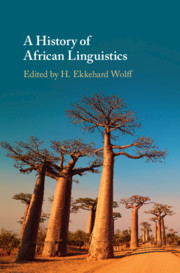Book contents
- A History of African Linguistics
- A History of African Linguistics
- Copyright page
- Contents
- Figures
- Tables
- Contributors
- Preface
- Abbreviations and Acronyms
- 1 The History of African Linguistics
- 2 Western Europe: African Linguistics and the Colonial Project
- 3 African Linguistics in Central and Eastern Europe, and in the Nordic Countries
- 4 African Linguistics in North Africa
- 5 The Study of African Languages and Linguistics in North-Eastern Africa
- 6 African Linguistics in Southern Africa
- 7 African Linguistics in Eastern Africa
- 8 African Linguistics in Official English-Speaking West Africa
- 9 African Linguistics in Official French-Speaking West and Central Africa
- 10 African Linguistics in Official Portuguese- and Spanish-Speaking Africa
- 11 African Linguistics in the Americas
- 12 African Linguistics in Asia and Australia
- References
- Index – African Languages
- Index – Countries
- Index – Keywords
- Index – Persons
11 - African Linguistics in the Americas
Published online by Cambridge University Press: 31 May 2019
- A History of African Linguistics
- A History of African Linguistics
- Copyright page
- Contents
- Figures
- Tables
- Contributors
- Preface
- Abbreviations and Acronyms
- 1 The History of African Linguistics
- 2 Western Europe: African Linguistics and the Colonial Project
- 3 African Linguistics in Central and Eastern Europe, and in the Nordic Countries
- 4 African Linguistics in North Africa
- 5 The Study of African Languages and Linguistics in North-Eastern Africa
- 6 African Linguistics in Southern Africa
- 7 African Linguistics in Eastern Africa
- 8 African Linguistics in Official English-Speaking West Africa
- 9 African Linguistics in Official French-Speaking West and Central Africa
- 10 African Linguistics in Official Portuguese- and Spanish-Speaking Africa
- 11 African Linguistics in the Americas
- 12 African Linguistics in Asia and Australia
- References
- Index – African Languages
- Index – Countries
- Index – Keywords
- Index – Persons
Summary
Intelligence community (IC) and by extension the American government, Christian missions, Peace Corps and numerous research initiatives form the braid of North American scholarship on African languages. Mainstream North American linguistics continued to be relatively uninterested in Africa until recently. African languages gained importance when they proved relevant to linguistic theory, exhibiting features that caused theoreticians to reformulate their thinking. Interest was further stimulated when funding became available for the documentation of endangered languages. Missionaries have been more constant in their attention, although that work has changed to converge as missionaries, too, focused on literacy, language documentation and linguistic analysis. The study of African languages in Latin America had in focus the Spanish and Portuguese varieties spoken in former European colonies. In Brazil, research on African languages gave first priority to the lexicon and discussed the possibility of the Brazilian Portuguese having undergone a creolization process. In the other countries of Latin America, the situation is similar in the sense that, except the Creole of Colombia, the African presence was considered only to be found in the lexicon, which did not significantly modify the Hispanic varieties of the continent. In addition to the search for grammatical features of African languages in the linguistic varieties spoken in Latin America, there is still a strong interest in the identification of lexical elements mainly of Bantu origin.
- Type
- Chapter
- Information
- A History of African Linguistics , pp. 205 - 232Publisher: Cambridge University PressPrint publication year: 2019

